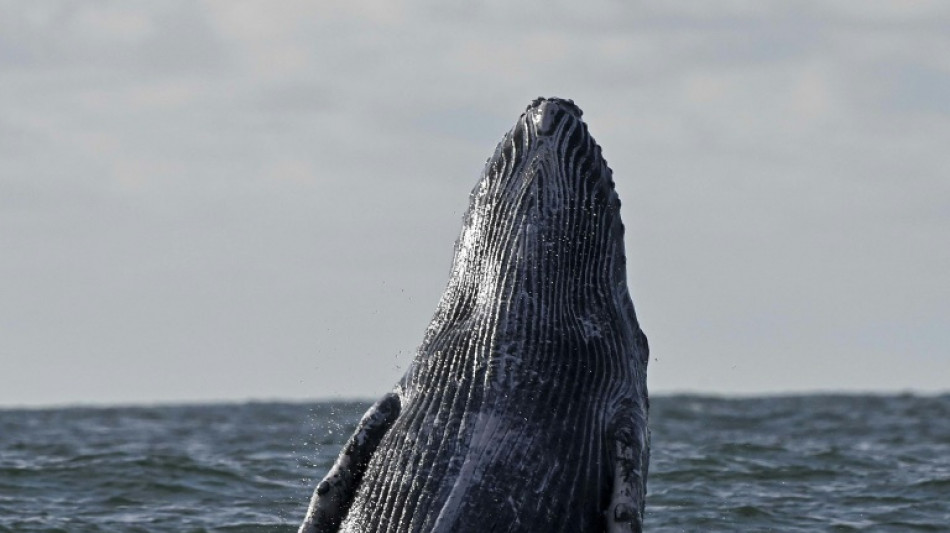
-
 Deadly storm sparks floods in Spain, disrupts Portugal vote
Deadly storm sparks floods in Spain, disrupts Portugal vote
-
Ukrainian flag bearer proud to show his country is still standing

-
 Carney scraps Canada EV sales mandate
Carney scraps Canada EV sales mandate
-
Morocco says evacuated 140,000 people due to severe weather

-
 Spurs boss Frank says Romero outburst 'dealt with internally'
Spurs boss Frank says Romero outburst 'dealt with internally'
-
Giannis suitors make deals as NBA trade deadline nears

-
 Carrick stresses significance of Munich air disaster to Man Utd history
Carrick stresses significance of Munich air disaster to Man Utd history
-
Record January window for transfers despite drop in spending

-
 'Burned inside their houses': Nigerians recount horror of massacre
'Burned inside their houses': Nigerians recount horror of massacre
-
Iran, US prepare for Oman talks after deadly protest crackdown

-
 Winter Olympics opening ceremony nears as virus disrupts ice hockey
Winter Olympics opening ceremony nears as virus disrupts ice hockey
-
Mining giant Rio Tinto abandons Glencore merger bid

-
 Davos forum opens probe into CEO Brende's Epstein links
Davos forum opens probe into CEO Brende's Epstein links
-
ECB warns of stronger euro impact, holds rates

-
 Famine spreading in Sudan's Darfur, warn UN-backed experts
Famine spreading in Sudan's Darfur, warn UN-backed experts
-
Lights back on in eastern Cuba after widespread blackout

-
 Russia, US agree to resume military contacts at Ukraine talks
Russia, US agree to resume military contacts at Ukraine talks
-
Greece aims to cut queues at ancient sites with new portal

-
 No time frame to get Palmer in 'perfect' shape - Rosenior
No time frame to get Palmer in 'perfect' shape - Rosenior
-
Stocks fall as tech valuation fears stoke volatility

-
 US Olympic body backs LA28 leadership amid Wasserman scandal
US Olympic body backs LA28 leadership amid Wasserman scandal
-
Gnabry extends Bayern Munich deal until 2028

-
 England captain Stokes suffers facial injury after being hit by ball
England captain Stokes suffers facial injury after being hit by ball
-
Italy captain Lamaro amongst trio set for 50th caps against Scotland

-
 Piastri plays down McLaren rivalry with champion Norris
Piastri plays down McLaren rivalry with champion Norris
-
ECB holds interest rates as strong euro causes jitters

-
 Spain, Portugal face floods and chaos after deadly new storm
Spain, Portugal face floods and chaos after deadly new storm
-
EU close to sealing trade deal with Australia

-
 German Cup final to stay in Berlin until 2030
German Cup final to stay in Berlin until 2030
-
What does Iran want from talks with the US?

-
 Taming the lion: Olympians take on Bormio's terrifying Stelvio piste
Taming the lion: Olympians take on Bormio's terrifying Stelvio piste
-
Wind turbine maker Vestas sees record revenue in 2025

-
 Italy's Casse tops second Olympic downhill training
Italy's Casse tops second Olympic downhill training
-
Anti-doping boss 'uncomfortable' with Valieva's coach at Olympics

-
 Bitcoin under $70,000 for first time since Trump's election
Bitcoin under $70,000 for first time since Trump's election
-
'I am sorry,' embattled UK PM tells Epstein victims

-
 England's Brook predicts record 300-plus scores at T20 World Cup
England's Brook predicts record 300-plus scores at T20 World Cup
-
Ukraine, Russia swap prisoners, US says 'work remains' to end war

-
 Wales' Rees-Zammit at full-back for Six Nations return against England
Wales' Rees-Zammit at full-back for Six Nations return against England
-
Sad horses and Draco Malfoy: China's unexpected Lunar New Year trends

-
 Hong Kong students dissolve pro-democracy group under 'severe' pressure
Hong Kong students dissolve pro-democracy group under 'severe' pressure
-
Germany claws back 59 mn euros from Amazon over price controls

-
 Germany claws back 70 mn euros from Amazon over price controls
Germany claws back 70 mn euros from Amazon over price controls
-
VW and Stellantis urge help to keep carmaking in Europe

-
 Stock markets drop amid tech concerns before rate calls
Stock markets drop amid tech concerns before rate calls
-
BBVA posts record profit after failed Sabadell takeover

-
 UN human rights agency in 'survival mode': chief
UN human rights agency in 'survival mode': chief
-
Greenpeace slams fossil fuel sponsors for Winter Olympics

-
 Greenpeace slams fossel fuel sponsors for Winter Olympics
Greenpeace slams fossel fuel sponsors for Winter Olympics
-
Kinghorn, Van der Merwe dropped by Scotland for Six Nations opener

| CMSC | -0.17% | 23.48 | $ | |
| SCS | 0.12% | 16.14 | $ | |
| NGG | -0.71% | 87.17 | $ | |
| RBGPF | 0.12% | 82.5 | $ | |
| RYCEF | -0.36% | 16.62 | $ | |
| RIO | -4.49% | 92.335 | $ | |
| CMSD | 0.21% | 23.92 | $ | |
| GSK | 3.44% | 59.27 | $ | |
| BTI | 0.61% | 62.01 | $ | |
| BCE | -4.2% | 25.279 | $ | |
| RELX | 0.73% | 30 | $ | |
| BCC | -2.52% | 88.01 | $ | |
| VOD | -6.98% | 14.685 | $ | |
| AZN | 0.78% | 188.92 | $ | |
| BP | -2.42% | 38.275 | $ | |
| JRI | 0.3% | 13.19 | $ |

Deep-sea mining noise pollution threatens whales: study
Scientists warned on Tuesday that controversial seabed mining could significantly threaten ocean ecosystems, especially blue whales and other cetaceans already stressed by shipping, pollution and climate change.
A study in the journal Frontiers in Marine Science found that commercial-scale extraction of valuable minerals from the ocean floor, which could begin for the first time later this year, would damage habitats and interfere with the way cetaceans communicate.
Earlier research has detailed the likely destructive impact of deep-sea mining on the ocean floor. The new analysis by the University of Exeter and Greenpeace Research Laboratories shifts the spotlight to marine megafauna and noise pollution.
"Cetaceans rely on sound for every aspect of their behaviour, such as foraging, breeding and navigation," Kirsten Thompson, the lead author of the study and a lecturer in marine mammal biology at the University of Exeter, told AFP.
"That's why noise pollution from deep seabed mining is a particular concern."
The report points to overlap between the frequencies at which cetaceans communicate and the sound that would be generated by drilling, dredging and the acoustic telemetry needed to remotely operate vehicles mining the seabed.
This phenomenon, called "auditory masking", has been previously shown to interfere with the communications of marine mammals and to alter their behaviour.
Underwater noise generated by industrial or military operations can induce foraging whales to surface more quickly than normal, increasing the risk of gas bubbles forming in the bloodstream, which can in turn lead to stranding and death.
Other research has found that man-made noise increased the risk of separation between humpback whales and their calves, which communicate via quiet vocalisations.
- 'Two-year rule' -
The new findings come with some caveats.
Because seabed mining has yet to be authorised anywhere in the oceans, Thompson and her team did not have real-world data to draw from.
They thus used proxies from other industries to estimate the expected sound from industrial seabed mining operations.
Thompson also pointed to knowledge gaps in the distribution of marine mammal species, mainly due to the high cost of biological surveys across vast expanses of ocean.
The impact of deep-sea mining on cetaceans is predicted to be particularly acute in the Pacific Ocean's Clarion-Clipperton Zone, a habitat for some two dozen cetacean species, including baleen whales, beaked whales, sperm whales and Risso's dolphins.
The region is poised to become home to the world's largest extraction of manganese nodule, a mineral crucial in electric car batteries.
The tiny island nation of Nauru, in particular, sees deep-sea mining as a potentially lucrative income stream for climate adaptation in the face of sea level rise and increasingly powerful storms.
In June 2021, the Nauru government triggered a rule requiring the International Seabed Authority (ISA) -- the UN body governing deep-sea exploration and exploitation in areas beyond national jurisdiction -- to finalise regulations for high-seas mining worldwide within two years.
According to this so-called "two-year rule", mining could go ahead in July this year with whatever regulations the ISA has formulated by that time.
"Given the imminent threat that the two-year rule presents to ocean conservation, we suggest there is no time to waste," said Thompson.
R.Halabi--SF-PST




